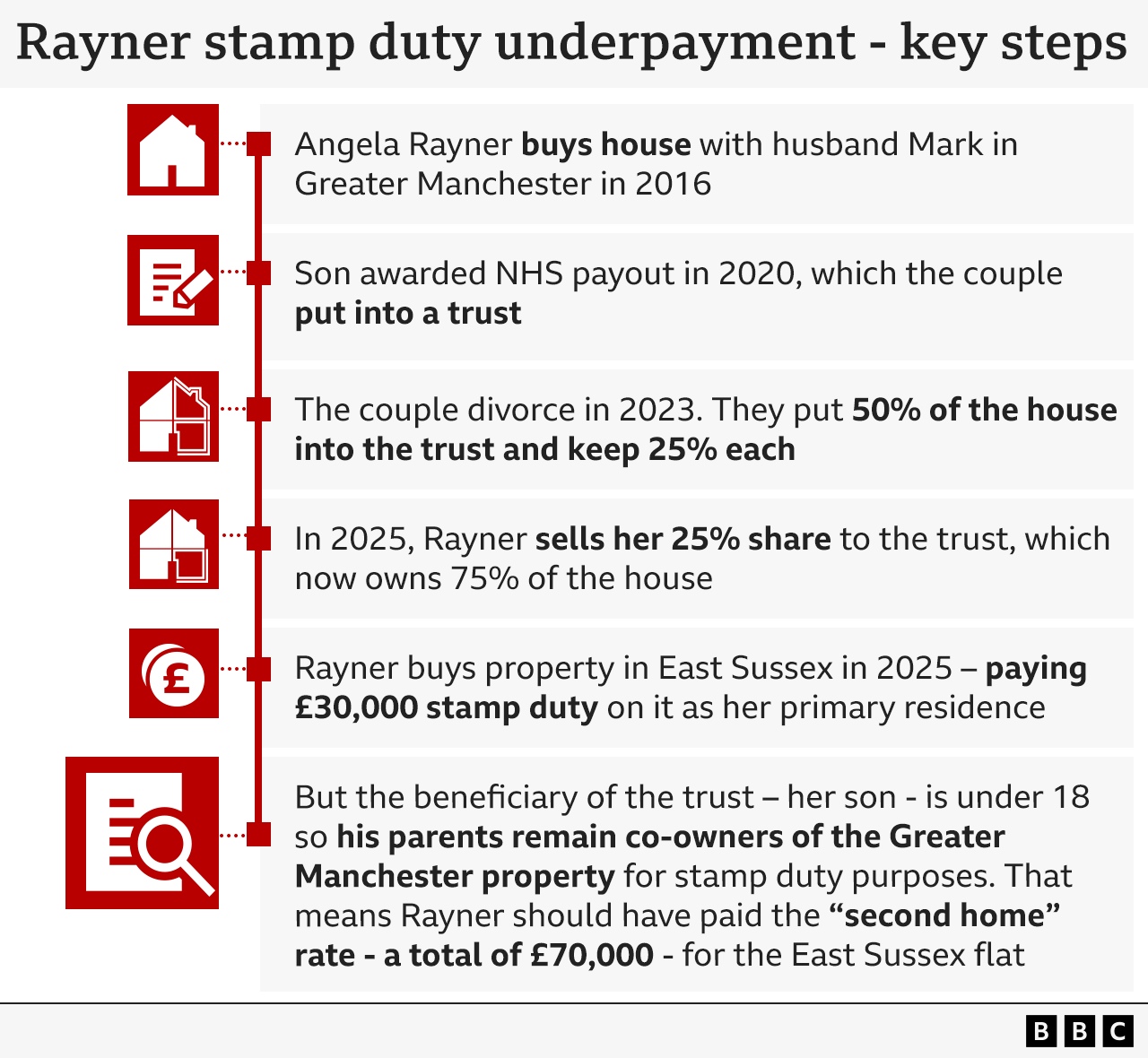PM refuses to say if he will sack Rayner if she broke rules
Watch: BBC's Chris Mason questions Starmer on Rayner tax investigation
- Published
Sir Keir Starmer has repeatedly refused to say if he will sack Deputy Prime Minister and Housing Secretary Angela Rayner if his standards adviser concludes she broke the ministerial code.
Rayner referred herself to Sir Laurie Magnus after she admitted underpaying stamp duty on an £800,000 flat in Hove.
She has said the "mistake" was the result of incorrect legal advice which failed to "properly take account" of her circumstances.
Allies of Rayner have said she took advice from her conveyancer and two experts on trust law.
The conveyancing firm used by Rayner has said it did not give her tax advice, but calculated the stamp duty owed "based on the facts and information provided to us".
Speaking to the BBC, Sir Keir said he would "of course act" on Sir Laurie's report which he expected to be "comprehensive" and delivered quickly but would not be drawn on whether Rayner would be fired.
He rejected a comparison with Boris Johnson, who as prime minister did not sack Priti Patel as his home secretary despite the then-adviser, Sir Alex Allen, saying she had broken the ministerial code.
The prime minister said he had strengthened the ministerial code and the role of the adviser since taking office.
The code sets out the standards ministers are expected to uphold including honesty and integrity.
Sir Laurie can advise on whether ministers have adhered to the code, but the prime minister decides what, if any, action to take.
Asked about the report, which sources say could be published as early as Friday, Sir Keir said: "I do think in the end we need to establish the facts, which the independent advisor will do and come to a conclusion.
"I don't think it'll take long now for that bit of process to conclude and then, of course, it does fall to me.
"I completely accept that, to make a decision based on what I see in that report."
The prime minister has the power to dismiss Rayner from her roles as housing secretary and deputy prime minister but cannot remove her as deputy Labour Party leader because she was elected to the role by Labour members.
Sir Keir said he knew on Monday that Rayner was taking further advice on her tax payments.
Angela Rayner - and the rest of us - now face waiting game
- Published4 September
A timeline of the Angela Rayner flat row
- Published5 September
What we do and don't know about Angela Rayner's tax advice
- Published4 September
Rayner's team initially said she had paid the right amount of stamp duty on Thursday in response to a report in the Daily Telegraph.
However, on Friday evening she asked a lawyer to review her situation. On Wednesday morning the KC offered their final advice which concluded she had not paid the right amount.
Acknowledging the underpayment, Rayner said: "I deeply regret the error that has been made. I am committed to resolving this matter fully and providing the transparency that public service demands."
The prime minister - along with other cabinet ministers - has backed Rayner, telling MPs he was "very proud to sit alongside" her.
Both the Conservative and Reform UK have called on Rayner to resign.
Conservative leader Kemi Badenoch said the prime minister did "not have a backbone".
"Time and time again he has said that if this situation happens he would instantly sack people.
"When the shoe was on the other foot when he was leader of the opposition he went after people for this same scenario – as did Angela Rayner.
"Now that the shoe is on the other foot what we are seeing from them is hypocrisy."
Badenoch said Rayner's admission she had not paid the correct amount of stamp duty should have led to "an instant resignation from her or an instant sacking from Keir Starmer".

As first reported in The Guardian,, external the deputy prime minister used Verrico & Associates, a small family conveyancing firm in Kent to handle the purchase of the Hove property at the centre of a tax dispute.
Joanna Verrico, founder of the Herne Bay-based firm, said the company had calculated the stamp duty "based on the facts and information provided to us" adding: "We believe that we did everything correctly and in good faith."
She said the company "does not deal with trusts or offer tax advice".
Experts have previously said that conveyancers would be unlikely to be able to give specialist tax advice of the kind Rayner required.
It remains unclear who the two trust experts were who Rayner consulted, and whether they have specialised knowledge on stamp duty tax.
Additional reporting by Kate Whannel